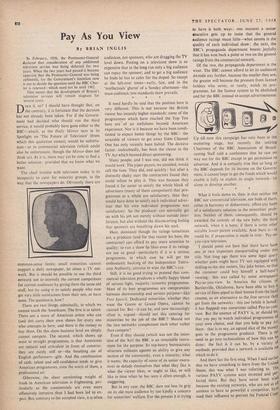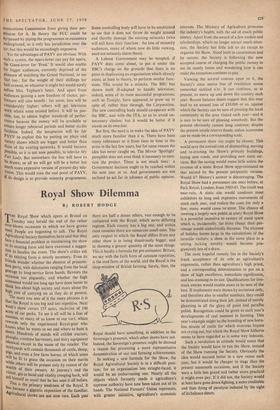Pay As You View
By BRIAN INGLIS in February, 1956, the Postmaster-General declared that consideration of any additional television service was being deferred for two years. When the two years had passed it became apparent that the Postmaster-General was being optimistic, for the GoVernment's intention now is not to decide the question until the BBC Char- ter is renewed—which need not be until 1962.
That means that the development of Britain's television services will remain stagnant for several years.
DOES it, so? I should have -thought that, on the contrary, it is fortunate that the decision has not already been taken. For if the Govern- ment had decided who should run the third service, it would probably have gone either to the BBC—which, as the Daily Mirror says in its Spotlight on 'The Future of Television' (from which this quotation comes), would be unfortu- nate—or to commercial television (which could also be unfortunate, though the Mirror does not think so). As it is, there may yet be time to find a better solution: provided that we know what we want.
The chief trouble with television today is its incapacity to cater for minority groups, in the way that the newspapers do. Obviously there are common-sense limits; small minorities cannot support a daily newspaper, let alone a TV net- work. But it should be possible to use the third network not to intensify the current competition for current audiences by giving them the same old -stuff, but by using it to satisfy people who now get very little satisfaction from their sets, or have none. The question is, how?
There are two things, admittedly, in which we cannot touch the Americans. The first is in talent. There are a score of American artists who can (and do) carry .their own shows for every one who attempts to here; and there is the money to buy them. On this show-business level we simply cannot compete. The second, which shows up most in straight programmes, is that Americans are natural and articulate in front of cameras; they are rarely stiff or—the besetting sin of English performers—glib. And the combination of cash, talent and self-confidence tends to give American programmes, even the worst of them, a professional air.
Otherwise, the sheer unrelenting weight of trash in American television is frightening, par- ticularly as the commercials are even more offensively intrusive than I had been led to ex- pect. But, contrary to the accepted view, it is often audiences, not sponsors, who are dragging the TV level down. Putting on a television show is so expensive that in the long run only a big audience can repay the sponsor; and to get a big audience he finds he has to cater for the doped. So except at the left-over times—early, late, and in the `intellectuals' ghetto' of a Sunday afternoon—the mass-audience, low-standards show prevails.
It need hardly be said that the position here is very different. This is not because the British viewer has innately higher standards; some of the programmes which have reached the Top Ten here are of an awfulness beyond American experience. Nor is it because we have been condi- tioned to expect better things by the BBC: the scramble of viewers to get away from Channel One has only recently been halted. The decisive factor, undoubtedly, has been the clause in the TV Act which banned direct, sponsoring.
Many people, and I was one, did not think it would work. The piper-payers, we assumed, would call the tune. They did, and quickly : but after a distinctly shaky start the contractors found they could refuse to play it. This was because they found it far easier to satisfy the whole block of advertisers (many of them competitors) that pro- grammes as a whole are satisfactory, than they would have done to satisfy each individual adver- tiser that his own individual programme was satisfactory. So the producer can normally get on with his job not merely without outside inter- ference,,but also without the disconcerting feeling that sponsors are breathing down his neck.
Here, dominant though the ratings sometimes are, a producer (and for that matter his boss, the contractor) can afford to pay more attention to quality; to run a show he likes even if its ratings are not so good—particularly if it is a serious programme, in which case he will get the enthusiastic backing of the Independent Televi- sion Authority, anxious to wipe the BBC's eye.
Still, it is no good trying to pretend that com- mercial television produces a wholly happy' blend of serious/light, majority/minority programmes. Most of its best programmes are compromises between showmanship and serious purposelike Free Speech. Dedicated minorities, whether they want the Goons or Grand Opera, cannot be catered for. But—it can be, and now increasingly often is, argued—should not this catering for minorities be the job of the BBC? Should not the two networks complement each other rather than compete?
Even if they should (which was not the inten- tion of the Act) the BBC is an unsuitable instru- ment for .the purpose. Its top-heavy bureaucratic structure militates against its ability to give any section of the community, even a minority, what it wants; the capacity of some of its senior execu- tives to delude themselves that what they like is what the viewer likes, or ought to like, or will like in time when he has seen it often enough, is staggering.
But in any case, the BBC dare not lose its grip on its old mass audience by too kindly a concern for minorities' welfare. For the present it is trying to have it both ways: one moment a senior executive gets up to insist that the general audience ratings mean little—what counts is the quality of each individual show: the next, the BBC's propaganda department boasts joyfully that it has won back a point or two on the general ratings from the commercial network.
Of the two, the propaganda department is the wiser. The BBC cannot afford to let its audiences dwindle any further, because the smaller they are, the greater will become the pressure from licence holders who never, or rarely, watch its pro- grammes, for the licence system to be abolished and for the BBC instead to accept advertisements.
Up till now this campaign has only been in the muttering stage, but recently the retiring Chairman of, the BBC Association of Broad- casting Staff told a conference that he saw no way out for the BBC except to get permission to advertise. And it is certainly true that so long as the BBC depends for its income on the Govern- ment, it cannot hope to get the funds which would enable it fully to exploit its single network—Jet alone to develop another.
What it boils down to, then, is that neither the BBC nor commercial television, nor both of them, either in harmony or disharmony, offers any hope of a satisfactory solution to the minorities' prob- lem. Neither of them, consequently, should be awarded the custody of the new baby, the third network, when it is born; if there is some other suitable foster-parent available. And there is—or could be, if preparation is made in time: Pay-as- you-view television.
I should point out here that there have been one or two impostors masquerading under this title. Not long ago there was some legal query whether pubs might have TV sets equipped with shilling-in-the-slot meters, like juke boxes, so that the customer could buy himself a half-hour's viewing: this was called by some newspapers Pay-as-you-view. In America the citizens of Bartlesville, Oklahoma, have been able to buy a service of films piped to their homes from the local cinema, as an alternative to the,free service they get from the networks: this too (while it lasted: it has flopped) was sometimes called Pay-as-you' view. But the essence of PAYV is, or should be, that you pay to watch individual programmes of your own choice, and that you help to pay for them : that is to say, an agreed slice of the money goes to the programme producer. There is no need to go into technicalities of how this can be done: the fact is it can be, by a variety of methods, provided that a network is available on which to do it.
And there lies the first snag. When I said earlier that we have something to learn from the United States, this was what I was referring to. The various PAYV systems were invented and per- fected there. But they have never been tried because the existing networks, who are not at all anxious to have so powerful a competitor, have used their influence, to prevent the Federal Cont. munications Commission from giving their per- Mission for it. In theory the FCC could be by-passed by piping the programmes to customers Underground, as it only has jurisdiction over the air; but this would be exceedingly expensive.
Yet the advantages of PAYV are obvious. With such a system, the opera-lover can pay for opera, the Goon-lover for 'Fred.' It would also enable far bigger audiences, currently deprived of the Pleasure of watching the Grand National, to see that too : for the weight of their shillings (or half-crowns, or whatever it might be) would surely soften Mrs. Topham's heart. And apart from audiences gaining a new freedom of choice, per- formers will also benefit : for some, fees will be Considerably higher; others will get television Work where none existed before. It will be pos- sible, too, to obtain higher standards of perfor- mance because the money will be available to ensure longer rehearsal periods and better studio facilities. Indeed, the temptation will be for PAYV to exploit this by putting on plays and variety shows which are bigger and better than those of the existing networks. It would become Possible, as it is not now possible, to televise My Fair Lady. But somewhere the line will have to be drawn; or all we will get will be a better but much more expensive version of present-day tele- vision. This would miss the real point of PAYV, If as design is to provide minority programmes. Some controlling body will have to be established to see that it does not throw its weight around and thereby damage the existing networks (who will still have their function : the loss of minority audiences, many of whom now do little viewing, need not seriously alarm them).
A Labour Government may be tempted, if PAYV does come about, to put it under the BBC's charge on the grounds that there is no point in duplicating an organisation which already exists, at least in theory, to perform similar func- tions. This would be a mistake. The BBC has shown itself ill-adapted to handle television; indeed, some of its most successful programmes, such as Tonight, have appeared to grow up in spite of, rather than through, the Corporation. The new controlling body should co-operate with the BBC, and with the 1TA, so as to avoid un- necessary clashes; but it would be better if it stands on its own feet.
But first, the need is to make the idea of PAYV much more familiar than it is. There have been many references to it from time to time in the press in the last few years, but for some reason the idea has never caught on. The Mirror 'Spotlight' pamphlet does not even think it necessary to men- tion the project. There is not much time : a Government decision ought to be reached within the next year or so. And governments are not inclined to act far in advance of public opinion.



































 Previous page
Previous page